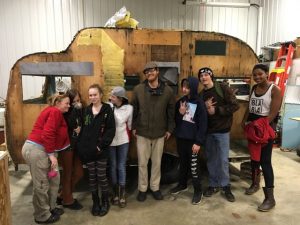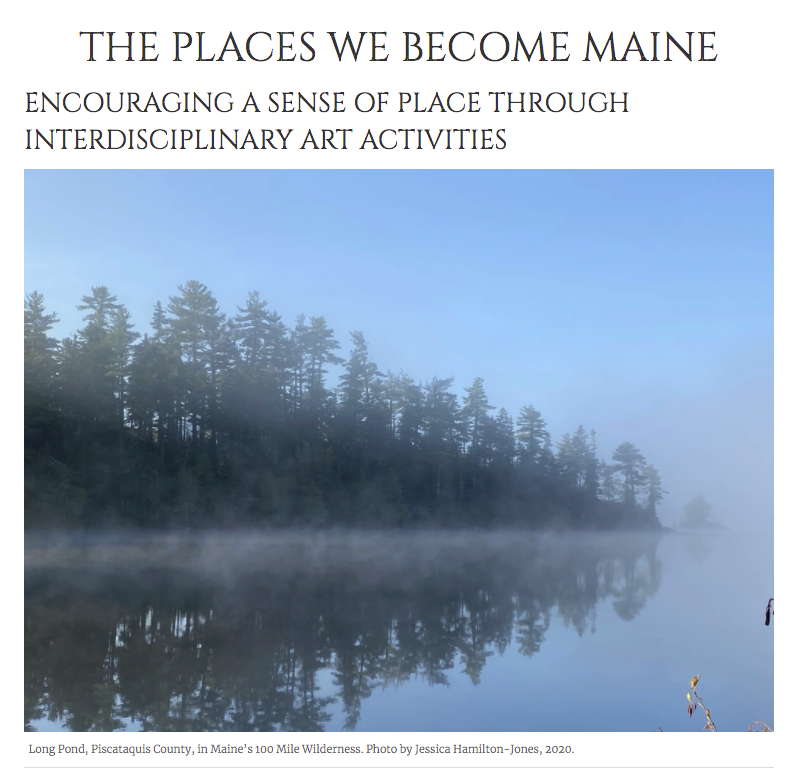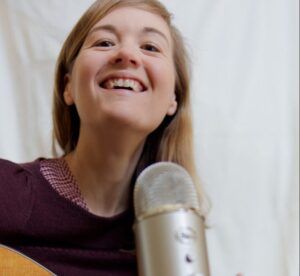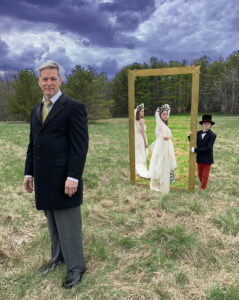News and Updates
MAIS/Maine Studies Graduates – 2021
Two Maine Studies students, Mary Holt and Jessica Hamilton-Jones, completed their MA in Interdisciplinary Studies degrees in May of 2021. An additional student, Anne Bardaglia, received her MA in August of 2021.
Mary Holt, who works at the Glickman Family Library Special Collections Department at the University of Southern Maine, created an audio podcast on Maine humor for her master’s project. Entitled “My Contribution to Art and Culture,” a name derived from a quote by Maine humorist Joe Perham, the podcast looks at the storytelling aspect of Downeast humor, and how the images conveyed represent (or don’t) real life. The podcast, along with another Mary created about the early LGBTQ+ movement in Maine, can be streamed on her website, There from Here.
Jessica Hamilton-Jones, an artist and alternative education high school teacher who lives in the Waterville area, created an innovative ebook to help artists and students study and depict Maine places. Called The Places we Become Maine: Encouraging a Sense of Place Through Interactive Art Activities, the ebook takes readers through a series of place-based drawing and painting lessons, each focused on a particular setting or idea such as wildlife, botany, and maps.
Anne Bardaglio, who lives in the midcoast, wrote a thesis on the subject of “concealment objects,” which are items hidden in houses and other structures by their builders or occupants. In her case the object was a man’s work boot, found in her own house during renovations, which she surmises was placed there by the widow of a Finnish quarry worker at the turn of the last century. In addition to describing the research that led to this conclusion, Anne talked about the relationship between superstition and culture, and how certain traditions may transcend ethnic groups and become place-related.
The variety of high-quality master’s projects by these three graduates provides a glimpse of the type of research that has been conducted under the umbrella of Maine Studies.
Jack Pine Project Zoom Presentations
The Jack Pine Project was a community-based arts project designed to allow non-artists to use music, theater, and other art forms to express their feelings about the COVID-19 pandemic. Professional Maine artists were hired to conduct workshops with a variety of state residents, including cancer patients, incarcerated veterans, actors, families with children, business owners, and others. In all, over 50 people took part in ten different workshops.
In April 2021, the results of three of these workshops were highlighted in a Zoom speaker series. Two Maine music therapists, along with a Maine-based theatre producer and director, presented the results of their workshops. The series was organized with assistance from the Fred Hutchinson Center, UMaine’s outreach and education center in Belfast, Maine.
The first talk, on April 16th, featured music therapists Carla Tanguay and Kate Beever, who conducted separate workshops that helped participants express their thoughts and feelings about the Covid pandemic through songs. Carla and Kate presented the songs created during the workshops and discussed the role that music therapy can play in helping community members process their experiences of the pandemic.
On April 23rd, playwright, director, and producer Stephen Legawiec presented several of the monologues written and performed by members of the Maine theater community in his workshop, “Scenes from a Darkened Stage.” Following the videos, Maine Folklife Center Director Kreg Ettenger moderated a discussion with several workshop participants. The full recording of the talk and discussion can be found here.
We thank Carla, Kate, Stephen and the other artists who took part in the Jack Pine Project, as well as those residents who took the time to learn a new craft and express their thoughts and feelings about the pandemic in new ways. While often painful, this process helped them understand and process what they experienced. It also showed once again the power of the arts to heal, transform, and document the human experience.
MAIS/Maine Studies Graduates – 2020
Three students in the MA in Interdisciplinary Studies (MAIS), conferred by the UMaine Graduate School, completed their degrees in May of 2020. The students were Christopher Betts of Bangor, Brandan Roberts of Waterville, and Paula Sheehan-Kopp of Portland.

Chris Betts completed a written master’s project that reported on his extensive experience with high school students in Maine’s alternative education system, including the Carleton Project, a private, experiential-learning based program that ran out of the Shaw House in Bangor. Chris employed numerous techniques in projects involving nature, the arts, and hands-on vocational learning, and reported on his experiences and the challenges of working with youth from difficult life circumstances as they negotiated their education.
Brandan created a web-based project using ArcGIS Story Maps on the historical figure Molly Ockett (Mary Agatha), an Abenaki woman who lived most of her life in 18th century western Maine. She was renowned as a healer and “medicine woman,” and is perhaps best known for saving the life (possibly) of an infant who later became Abraham Lincoln’s vice president, Hannibal Hamlin. Brandan’s website talks about her actual life, and describes how she has become both mythologized and caricatured in the parts of Maine she once called home.
Paula Sheehan-Kopp prepared a lengthy, deeply researched presentation on Maine’s Irish heritage that was presented in a COVID-modified virtual conference hosted by the British Association for Irish Studies. In addition, she began work on a website that will serve as a much-needed resource for teachers, researchers, Mainers of Irish descent, and others interested in the long and proud heritage of the Irish in Maine.
All three of the students gave presentations on their work at a virtual graduation ceremony on May 13, 2020. Following their presentations, Dr. Scott Delcourt, Associate Vice President for Graduate Studies and Senior Associate Dean of the Graduate School, virtually “hooded” the three MAIS recipients. The three also received copies of the Historical Atlas of Maine, edited by UMaine Professor of Geography Stephen Hornsby, and emeritus Professor of History Richard Judd, courtesy of the Maine Studies Program.
We heartily congratulate all three graduates of the MAIS degree, Maine Studies track, and wish them well in their future journeys!




